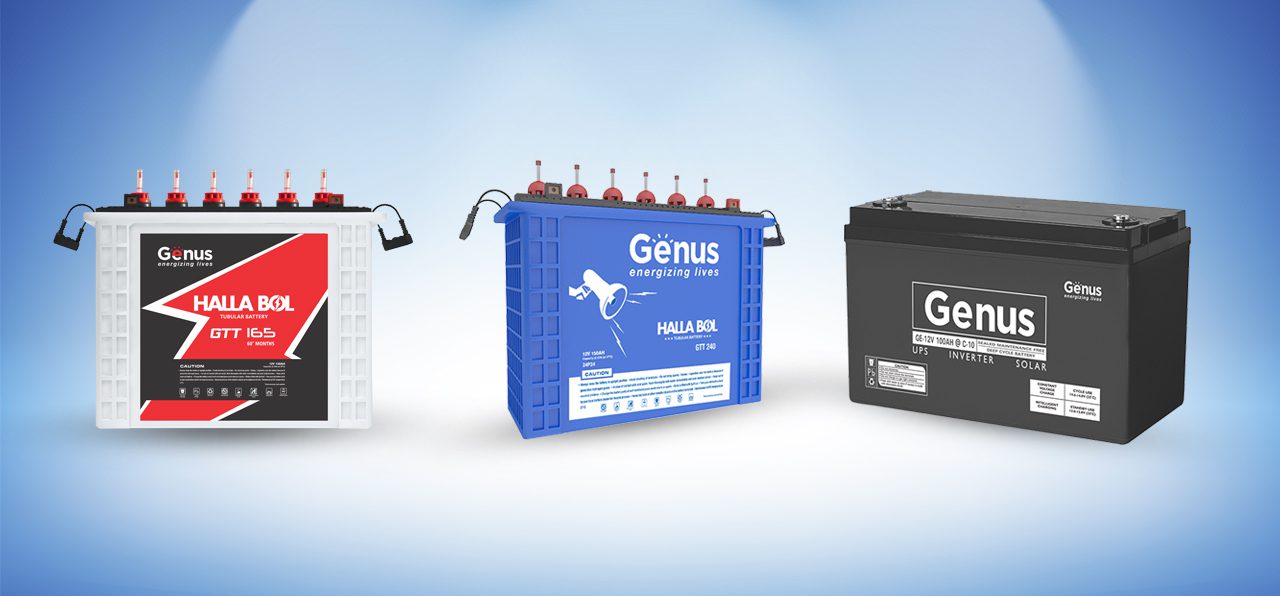
In today’s always-connected world, uninterrupted electricity is no longer a luxury- it is a necessity. From lighting and fans to routers, laptops, smart TVs and kitchen appliances, our daily comfort depends heavily on reliable power. This makes an inverter essential for running modern life smoothly. While the inverter ensures backup during power cuts, the real hero behind its performance is the battery. So the next question that arises in mind is “Which is the best inverter battery for home”? The answer to this question depends on your power needs, usage habits, budget and future readiness. In this blog, we are going to discuss the different important factors to help find the best inverter battery for home.
Key factors to consider before choosing an Inverter Battery
It is important to assess your household requirements before selecting a battery.
Power backup requirement:
List down the appliances you want to run during power cuts and estimate:
- Total load (in watts)
- Backup duration (hours)
This helps determine the Battery Capacity (Ah) and voltage (12V /24V / 48V) you need.
Frequency of power cuts
- Frequent and long outages-> High cycle batteries required
- Occasional outages -> Standard batteries may suffice
Maintenance preference
Some batteries require regular maintenance like water topping and cleaning while some are completely maintenance-free.
Budget vs long-term value
Traditional batteries are cheaper upfront but the new-age batteries like lithium offer higher efficiency, longer life and lower lifetime cost.
Solar compatibility and future readiness
In case you wish to go solar (now or later), then a solar inverter and battery might be the best option so you can for a battery that supports solar charging and deep cycling.
Types of inverter batteries to pick from
Tubular batteries (Traditional & Reliable)
Tubular batteries continue to be a popular choice for Indian homes due to their durability and affordability. If you choose tubular battery from trusted brands then you can expect them to provide stable, consistent and adequate power during long and frequent power outages too.
Premium quality tubular batteries come with long life, function at high temperatures and are resistant to corrosion as well. Here are some of the key benefits you get with tubular batteries from Genus:
Key benefits:
- Consistent and stable output
- Good performance during long outages
- High tolerance to overcharging (they are made with plates that don’t get overheated)
- Resistant to corrosion
- Batteries get charged quickly
- Suitable for grid and solar inverters
- Efficient deep discharge recovery
- Easy to read electrolyte level indicators
Things to note:
- Require periodic water topping
- Heavier than the modern alternatives
VRLA or SMF Batteries (Valve Regulated Lead Acid or Sealed Maintenance Free)
These batteries are designed for the users who prefer low maintenance and clearer operation. VRLA or SMF batteries are usually heavy-duty and can be used for various household applications. A good VRLA battery will be free from orientation constraints, have low resistance and will be of international size. These are best for apartments, small homes and users with limited ventilation.
Key benefits:
- No water topping required so hassle-free
- Spill-proof and leak-proof design, perfectly sealed
- No noxious fumes
- Factory charged and ready to use
- Recyclable and safe for environment
Things to note:
- Lower deep-cycle life compared to tubular or lithium
- Not ideal for very long or frequent power cuts
Solar batteries (For Hybrid and Solar Inverter Systems)
If you have or planning to have a solar inverter then you will naturally need a solar battery with a C10 rating. These batteries are designed to store excess energy produced by solar panels which can be used later after dark or when there is a power cut. They can handle deep discharges and frequent charge-discharge cycles. A premium solar battery can also work without a solar setup, so it will be a good buy if you are planning to go solar in the future.
High acid volumes ensure that these batteries need minimal maintenance. As they are composed of selenium low antimonial alloy, they operate efficiently at high temperature too.
Key benefits:
- Optimized for solar charging
- Low battery life
- Fast charging ability
- Deep discharge recovery
- Anti-corrosive nature
- Resistance to overheating
- High temperature tolerance
- Long service life
- Can handle frequent and long power cuts
- Easy to read electrolyte level indicators
- Can work even without solar initially (future-ready)
Tip: Always check for C10 or C20 rating for reliable backup performance
Lithium-ion Inverter Batteries (The best choice for modern homes)
Lithium-ion batteries have emerged as the most advanced and efficient inverter battery solution today. They serve as the best option for smart homes, solar users and anyone looking for long-term value.
Key benefits (Why Lithium is a game-changer)
- Compact, lightweight, and space-saving
- 3-5x longer lifespan than traditional batteries
- Zero maintenance (no water, no acid)
- Fast charging & high efficiency
- Consistent backup even at low charge levels
- Built-in Battery Management System (BMS) for safety
Way forward
All in all, choosing the best inverter battery for your home will depend on all the factors and battery types mentioned above. The best inverter battery for home is no longer a one-size-fits-all answer. With rising power needs and smarter homes, lithium-ion batteries are setting the new benchmark, while tubular and solar batteries still serve specific needs. Choosing wisely today means better comfort, lower maintenance and smarter savings tomorrow.
FAQs
Q1. Which inverter battery lasts the longest?
Lithium-ion batteries last the longest, often delivering 3000-6000+ cycles, compared to 1200-1800 cycles for traditional batteries.
Q2. Is a lithium inverter battery safe for home use?
Yes, high-quality lithium batteries from Genus come with advanced BMS protection against overcharging, overheating, short circuits and deep discharge.
Q3. Can I replace my existing battery with a lithium battery?
In most cases, yes-provided the inverter supports lithium compatibility. You need to always check the inverter specifications.
Q4. Which battery is best for solar inverter systems?
Lithium-ion batteries are ideal for solar system because of high charge efficiency and deep discharge capability.
Q5. Are lithium batteries better than the tubular batteries?
For modern homes, lithium batteries are better due to zero maintenance, faster charging, longer life and compact design.
